 W
WAin't Misbehavin' is a musical revue with a book by Murray Horwitz and Richard Maltby Jr., and music by various composers and lyricists as arranged and orchestrated by Luther Henderson. It is named after the song by Fats Waller, "Ain't Misbehavin'".
 W
WBandanna Land is a musical from 1908. A book written by Jesse A. Shipp with lyrics by Alex Rogers (aka Alec) Rogers (né Alexander Claude Rogers; 1876–1930), and music composed primarily by Will Marion Cook was released in accompaniment. Created by and featuring African Americans, it was the third musical written by the team whose previous works included In Dahomey (1902) and Abyssinia (1906). It was the last show featuring the duo of Bert Williams and George Walker, comedians who starred in these musicals. Walker became ill during the post-Broadway tour and died in 1911.
 W
WBlack Nativity is a retelling of the classic Nativity story with an entirely black cast. Traditional Christmas carols are sung in gospel style, with a few songs created specifically for the show. Originally written by Langston Hughes, the show was first performed Off-Broadway on December 11, 1961, and was one of the first plays written by an African American to be staged there. The show had a successful tour of Europe in 1962, one of its appearances being at the Spoleto Festival of Two Worlds in Italy. Black Nativity has been performed annually in Boston, Massachusetts at various locations, such as: the Elma Lewis School of Fine Arts, Boston Opera House, Tremont Temple, Roxbury Community College, Northeastern's Blackman Auditorium, and presently at Emerson College's Paramount Theater since 1969 & is considered the longest-running production of Langston Hughes' "Black Nativity." The original 160 singers were arranged by age group and vocal range, with an assortment of soloists, along with the narrator, and Mary and Joseph, who are both mute, as well as musicians & ASL interpreters.
 W
WBring in 'da Noise, Bring in 'da Funk is a musical that debuted Off-Broadway at the New York Shakespeare Festival/Public Theater in 1995 and moved to Broadway in 1996. The show was conceived and directed by George C. Wolfe, and featured music by Daryl Waters, Zane Mark and Ann Duquesnay; lyrics by Reg E. Gaines, George C. Wolfe and Ann Duquesnay; and a book by Reg E. Gaines. The choreography was by Savion Glover.
 W
WCabin in the Sky is a musical with music by Vernon Duke, book by Lynn Root, and lyrics by John Latouche. The musical opened on Broadway in 1940. The show is described as a "parable of Southern Negro Life with echoes of Ferenc Molnár's Liliom and Marc Connelly's The Green Pastures." Several songs from the Broadway musical were released as a 3-record shellac set under the title "The Music of Cabin in the Sky featuring Ethel Waters" in 1940.
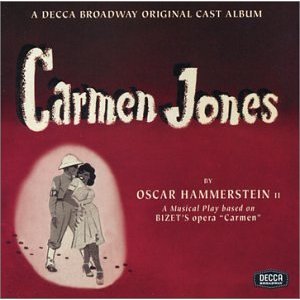 W
WCarmen Jones is a 1943 Broadway musical with music by Georges Bizet and lyrics and book by Oscar Hammerstein II which was performed at The Broadway Theatre. Conceptually, it is Bizet's opera Carmen updated to a World War II-era African-American setting. Bizet's opera was, in turn, based on the 1846 novella by Prosper Mérimée. The Broadway musical was produced by Billy Rose, using an all-black cast, and directed by Hassard Short. Robert Shaw prepared the choral portions of the show.
 W
WClorindy, or The Origin of the Cake Walk is a one-act musical by composer Will Marion Cook and librettist Paul Laurence Dunbar.
 W
WThe Color Purple is a musical with a book by Marsha Norman and music and lyrics by Brenda Russell, Allee Willis, and Stephen Bray. Based on the 1982 novel of the same name by Alice Walker and its 1985 film adaptation, the show follows the journey of Celie, an African-American woman in the American South from the early to mid-20th century.
 W
WDreamgirls is a Broadway musical, with music by Henry Krieger and lyrics and book by Tom Eyen. Based on the show business aspirations and successes of R&B acts such as The Supremes, The Shirelles, James Brown, Jackie Wilson, and others, the musical follows the story of a young female singing trio from Chicago, Illinois called "The Dreams", who become music superstars.
 W
WThe Emperor Jones is a 1920 play by American dramatist Eugene O'Neill that tells the tale of Brutus Jones, a resourceful, self-assured African American and a former Pullman porter, who kills another black man in a dice game, is jailed, and later escapes to a small, backward Caribbean island where he sets himself up as emperor. The play recounts his story in flashbacks as Brutus makes his way through the jungle in an attempt to escape former subjects who have rebelled against him.
 W
WFences is a 1985 play by American playwright August Wilson. Set in the 1950s, it is the sixth in Wilson's ten-part "Pittsburgh Cycle". Like all of the "Pittsburgh" plays, Fences explores the evolving African-American experience and examines race relations, among other themes. The play won the 1987 Pulitzer Prize for Drama and the 1987 Tony Award for Best Play. Fences was first developed at the Eugene O'Neill Theater Center's 1983 National Playwrights Conference and premiered at the Yale Repertory Theatre in 1985.
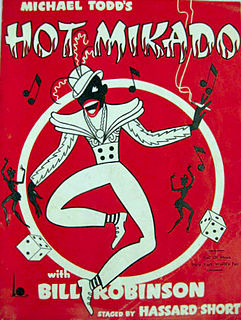 W
WThe Hot Mikado was a musical theatre adaptation of Gilbert and Sullivan's 1885 comic opera The Mikado with an African-American cast. It was first produced by Mike Todd on Broadway in 1939. It starred Bill "Bojangles" Robinson in the title role, with musical arrangements by Charles L. Cooke and direction by Hassard Short.
 W
WIn Dahomey: A Negro Musical Comedy is a landmark 1903 American musical comedy described by theatre historian Gerald Bordman as "the first full-length musical written and played by blacks to be performed at a major Broadway house." It features music by Will Marion Cook, book by Jesse A. Shipp, and lyrics by poet Paul Laurence Dunbar. It was written by Jesse A. Shipp as a satire on the American Colonization Society's back-to-Africa movement of the earlier nineteenth century.
 W
WJelly's Last Jam is a musical with a book by George C. Wolfe, lyrics by Susan Birkenhead, and music by Jelly Roll Morton and Luther Henderson. Based on the life and career of Ferdinand Joseph LaMothe, known as Jelly Roll Morton and generally regarded as one of the primary driving forces behind the introduction of jazz to the American public in the early 20th century, it also serves as a social commentary on the African-American experience during the era. LaMothe was born into a Louisiana Creole family that was established and free before the Civil War.
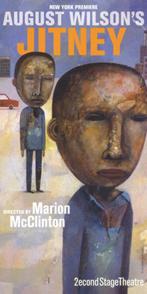 W
WJitney is a play by August Wilson. The eighth in his "Pittsburgh Cycle", this play is set in a worn-down gypsy cab station in Pittsburgh, Pennsylvania, in early autumn 1977. The play premiered on Broadway in 2017.
 W
WKing Hedley II is a play by American playwright August Wilson, the ninth in his ten-part series, The Pittsburgh Cycle. The play ran on Broadway in 2001 and was revived Off-Broadway in 2007.
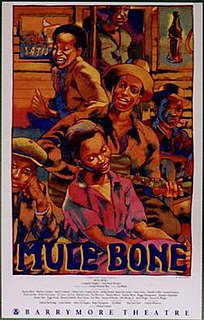 W
WMule Bone: A Comedy of Negro Life is a 1930 play by American authors Langston Hughes and Zora Neale Hurston. The process of writing the play led Hughes and Hurston, who had been close friends, to sever their relationship. Mule Bone was not staged until 1991, when it was produced in New York City by the Lincoln Center Theater.
 W
WOnce on This Island is a coming-of-age one-act stage musical with a book and lyrics by Lynn Ahrens and music by Stephen Flaherty. Based on the 1985 novel My Love, My Love; or, The Peasant Girl by Rosa Guy, it is set in the French Antilles archipelago in the Caribbean Sea. It concerns a peasant girl on a tropical island, who uses the power of love to bring people together of different social classes.
Passing Strange is a comedy-drama rock musical about a young African American's artistic journey of self-discovery, with strong elements of philosophical existentialism, metafiction, and the artistic journey. The musical's lyrics and book are by Stew with music and orchestrations by Heidi Rodewald and Stew. It was created in collaboration with director Annie Dorsen.
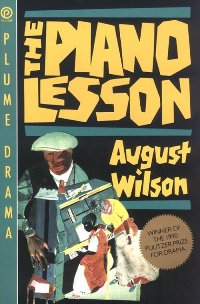 W
WThe Piano Lesson is a 1987 play by American playwright August Wilson. It is the fourth play in Wilson's The Pittsburgh Cycle. Wilson began writing this play by playing with the various answers regarding the possibility of "acquir[ing] a sense of self-worth by denying one's past". The Piano Lesson received the 1990 Pulitzer Prize for Drama.
 W
WPorgy: A Play in Four Acts is a play by Dorothy Heyward and DuBose Heyward, adapted from the short novel by DuBose Heyward. It was first produced by the Theatre Guild and presented October 10, 1927 – August 1928 at the Guild Theatre in New York City. Featuring a cast of African Americans at the insistence of its authors—a decision unusual for its time—the original production starred Frank Wilson, Evelyn Ellis, Jack Carter, and Rose McClendon. Porgy marked the Broadway directing debut of Rouben Mamoulian. The play ran a total of 55 weeks in New York, and the original cast toured the United States twice and performed for 11 consecutive weeks in London.
 W
WPorgy and Bess is an English-language opera by American composer George Gershwin, with a libretto written by author DuBose Heyward and lyricist Ira Gershwin. It was adapted from Dorothy Heyward and DuBose Heyward's play Porgy, itself an adaptation of DuBose Heyward's 1925 novel of the same name.
 W
WPurlie is a musical with a book by Ossie Davis, Philip Rose, and Peter Udell, lyrics by Udell and music by Gary Geld. It is based on Davis's 1961 play Purlie Victorious, which was later made into the 1963 film Gone Are the Days! and which included many of the original Broadway cast, including Davis, Ruby Dee, Alan Alda, Beah Richards, Godfrey Cambridge, and Sorrell Booke.
 W
WRadio Golf is a play by American playwright, August Wilson, the final installment in his ten-part series, The Century Cycle. It was first performed in 2005 by the Yale Repertory Theatre in New Haven, Connecticut and had its Broadway premiere in 2007 at the Cort Theatre. It is Wilson's final work.
 W
WRaisin is a musical with music by Judd Woldin, lyrics by Robert Brittan, and a book by Robert Nemiroff and Charlotte Zaltzberg. It is an adaptation of the Lorraine Hansberry play A Raisin in the Sun; the musical's book was co-written by Hansberry's husband, Robert Nemiroff.
 W
WRun, Little Chillun or Run Little Chillun is a folk opera written by Hall Johnson. According to James Vernon Hatch and Leo Hamalian, it is one of the most successful musical dramas of the Harlem Renaissance. It was the first Broadway show directed by an African-American.
 W
WSeven Guitars is a 1995 play by American playwright August Wilson. It focuses on seven African-American characters in the year 1948. The play begins and ends after the funeral of one of the main characters, showing events leading to the funeral in flashbacks. Seven Guitars represents the 1940s entry in Wilson's Pittsburgh Cycle, a decade-by-decade anthology of African-American life in Pittsburgh, Pennsylvania during the twentieth century; Wilson would revisit the stories of some of these characters in King Hedley II, set in the 1980s.
 W
WShuffle Along is a musical composed by Eubie Blake, with lyrics by Noble Sissle, and a revue-style plot written by the comedy duo Flournoy Miller and Aubrey Lyles. The first all-Black hit Broadway show, it was a landmark in African-American musical theater, credited with inspiring the Harlem Renaissance of the 1920s and '30s.
 W
WTimbuktu! is a musical, with lyrics by George Forrest and Robert Wright, set to music by Borodin, Forrest and Wright. The book is by Luther Davis. It is a resetting of Forrest and Wright's musical Kismet. The musical is set in 1361 in Timbuktu, in the Empire of Mali, West Africa.
 W
WTreemonisha (1911) is an opera by American ragtime composer Scott Joplin. It is sometimes referred to as a "ragtime opera", though Joplin did not refer to it as such and it encompasses a wide range of musical styles. The music of Treemonisha includes an overture and prelude, along with various recitatives, choruses, small ensemble pieces, a ballet, and a few arias.
 W
WTwo Trains Running is a play by American playwright August Wilson, the sixth in his ten-part series The Pittsburgh Cycle. The play takes place in the Hill District, an African-American neighborhood in Pittsburgh, Pennsylvania, in 1969. It explores the social and psychological manifestations of changing attitudes toward race from the perspective of its urban Black characters. The play premiered on Broadway in 1993 and was a finalist for the Pulitzer Prize for Drama.
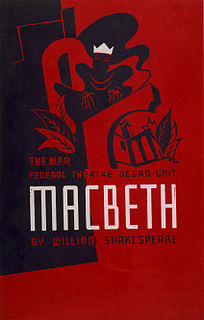 W
WThe Voodoo Macbeth is a common nickname for the Federal Theatre Project's 1936 New York production of William Shakespeare's Macbeth. Orson Welles adapted and directed the production, moved the play's setting from Scotland to a fictional Caribbean island, recruited an entirely Black cast, and earned the nickname for his production from the Haitian vodou that fulfilled the role of Scottish witchcraft. A box office sensation, the production is regarded as a landmark theatrical event for several reasons: its innovative interpretation of the play, its success in promoting African-American theatre, and its role in securing the reputation of its 20-year-old director.
 W
WThe Wiz: The Super Soul Musical "Wonderful Wizard of Oz" is a musical with music and lyrics by Charlie Smalls and book by William F. Brown. It is a retelling of L. Frank Baum's children's novel The Wonderful Wizard of Oz (1900) in the context of contemporary African-American culture. It opened on October 21, 1974, at the Morris A. Mechanic Theatre in Baltimore, and moved to Broadway's Majestic Theatre with a new cast on January 5, 1975.
 W
WYour Arms Too Short to Box with God: A Soaring Celebration in Song and Dance is a Broadway musical based on the Biblical Book of Matthew, with music and lyrics by Alex Bradford and a book by Vinnette Carroll, who also directed. Micki Grant was credited for "additional music and lyrics."